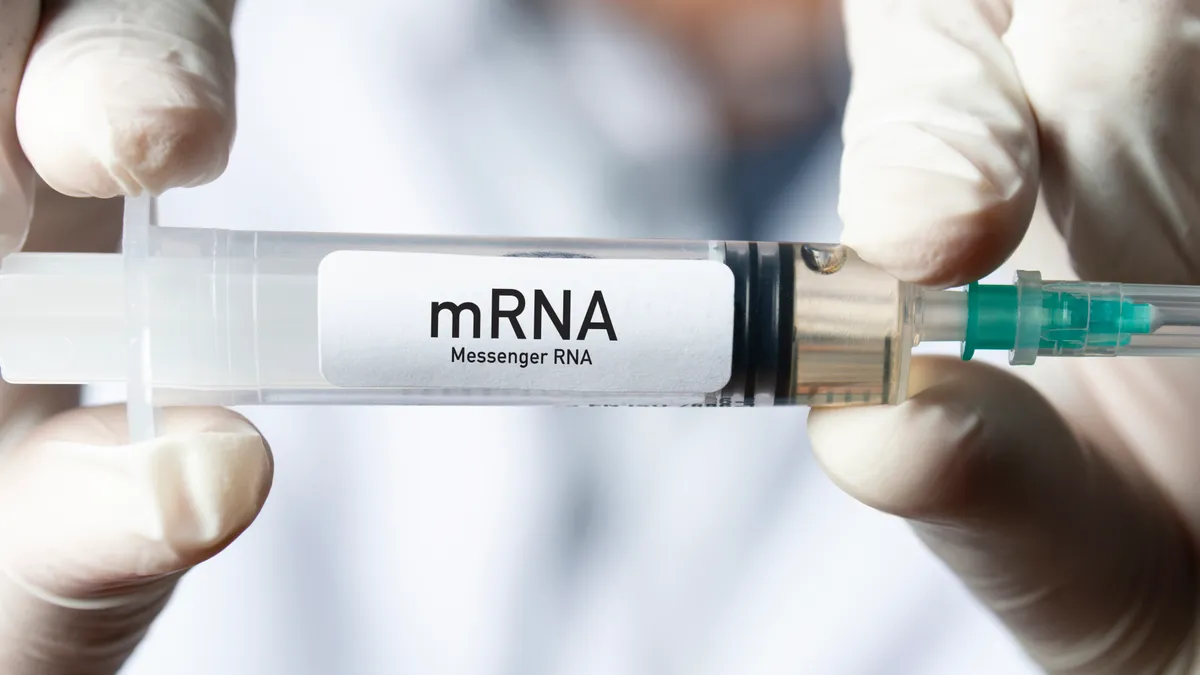Five years after the start of the COVID-19 pandemic, U.S. federal and state health agencies are threatening to abandon research in areas that were critical to ending the global crisis: vaccines and the mRNA technologies behind them.

The unparalleled success of mRNA vaccines could have been the technology’s undoing by drawing backlash in political policy and public perception, said Kate Broderick, chief innovation officer at TriLink Biotechnologies and Maravai Lifesciences. Now, researchers, vaccine makers and health experts are seeing funding evaporate and scientific progress on the verge of coming to a standstill.
At the World Vaccine Congress held last week in Washington, D.C., Broderick and fellow attendees noted a lack of government representation, even where officials from the FDA, CDC and other agencies were part of the meeting’s original agenda.
“They just haven’t been able to attend,” said Broderick, whose companies develop companion mRNA technologies, including the molecular caps that made COVID vaccines like Pfizer’s more effective. “That’s the most tangible, obvious difference from past years, where they’ve had a fairly robust attendance.”
A lack of engagement from public officials doesn’t bode well for future abatement of infectious diseases — a challenge exemplified by the ongoing measles outbreak, she said, reiterating a phrase being tossed around at the WVC: “Epidemics are inevitable, but pandemics are preventable.”
Despite rampant misinformation and widespread skepticism around vaccines and mRNA, Broderick and fellow life sciences leaders hope to communicate what’s at stake if scientific progress and disease prevention come to a screeching halt.
Taking it to the Hill
Meeting with congressional staffers last week while the legislative body was out of session, Broderick found that most people she talked to were willing to have a conversation about mRNA’s future potential not just in vaccines, but in other areas of medicine.
“We’re trying to take an approach of education, of highlighting to individuals on the Hill what an incredible opportunity this technology has … in the future in cancer and rare diseases,” Broderick said. “That this is such a positive for the country from an economic standpoint, from an innovation standpoint and from a national security standpoint.”
Getting those points across the table could open up lines of communication with policymakers and public health leaders who look at mRNA through a narrower lens.
“Being the absolute forefront of the best science was a title the U.S. proudly held, and for us to be saying we’re not going to support this area that’s so important has the potential to be even more transformative.”

Kate Broderick
Chief innovation officer, TriLink and Maravai
“I doubt there’s a single person out there who wouldn’t agree that we need better cancer therapies or that we need to study rare diseases for which there’s no therapeutic option,” Broderick said. “The overarching message is, let the data speak for itself.”
But often, other narratives have broader appeal. Broderick said that much of the criticism levied against mRNA vaccines has been toward gathering more safety data. Still, there hasn’t been much clarity around what that means, she said.
“What I keep hearing is a narrative about the safety of COVID vaccines, and while a lot of individuals are saying they would like to see more safety studies, this is difficult for me to process because we’re talking about a vaccine that’s now been in billions of people,” Broderick said. “It would be hard to see how we could do more safety testing or what we could do differently that would give us a different answer.”
Government officials have proposed redoing safety testing, but Broderick isn’t sure what that would accomplish.
“At a time when we’re thinking about efficiencies and streamlining, I would have to hear the proposal to better understand what that means and why that would put us in a different place than we are today,” Broderick said.
Cuts to funding
Widespread cuts to NIH funding and more targeted efforts to scrub mRNA from research grants have led to fear in the scientific community of hampered progress in a promising field. Although mRNA vaccines appear to have been the impetus to the crackdown, other areas like oncology could be collateral damage.
“On a clinical and medical level, we will be missing out on a next generation of therapies that will have the opportunity to treat late-stage cancers,” Broderick said, pointing out there’s not much today’s treatments can do about stage 4 cancer, whereas personalized cancer vaccines using mRNA could be game-changing.
Halting research funding and access to mRNA vaccines could also have lasting repercussions for the country’s global position in academia and industry, Broderick said.
“If we stop this, we’re stopping a whole new generation of young people being trained for incredible jobs that push society into better places through top-end innovation and technology,” Broderick said. “Being the absolute forefront of the best science was a title the U.S. proudly held, and for us to be saying we’re not going to support this area that’s so important has the potential to be even more transformative.”
But while politics can change scientific priorities in the short term, progress will win out in the long run, Broderick said. For example, the pushback against stem cell research in the 1990s showcased how regressive narratives can take hold of political decisionmakers. Then, Nancy Reagan became a proponent of the technology during her husband’s Alzheimer’s disease journey, improving public support.
“When the public is exposed to the potential these technologies can have, seeing how that directly impacts them or a loved one, that can change the tide of public perception,” Broderick said.
Scientific guilt
In the face of a measles outbreak in which children have died, Broderick blames herself and others in the research arena for failing to illustrate to the public why vaccines are critical. Studies have shown that falling vaccine rates have led to the measles’ comeback.
“I internalize that maybe the scientific community needs to reflect and see where we could have done better to present what we’re doing to the public,” Broderick said.
During the first six months of the COVID-19 pandemic, Broderick felt a palpable sense of public backing for what researchers could accomplish in a fight against the virus. But as the goodwill began to dissipate, backlash gained more steam, she said.
“Across the board, there’s anti-vaccine sentiment, and as part of this scientific community, we need to regain some of that public trust and goodwill that has been eroded,” Broderick said. “We’ve completely missed the mark on educating people — even that word seems patronizing, and that’s probably left us where we are today.”
Data shows the measles vaccine is safe and effective, but distilling the findings of a multi-million person trial isn’t as easily digested as a conspiracy theory on TikTok, Broderick said. But education is the only way forward.
“I have to believe that as long as we stick to our fundamental principles of the truth in the data and the truth in the safety, science will prove out in the end,” Broderick said.





















